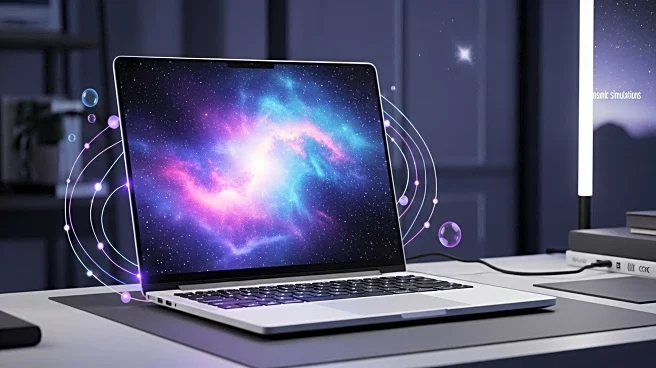What is the story about?
What's Happening?
An international team of researchers has developed an emulator named Effort.jl, which allows cosmic simulations that previously required supercomputers to be run on standard laptops. This development is significant as it enables the analysis of the universe's large-scale structure using the Effective Field Theory of Large-Scale Structure (EFTofLSS) model. The emulator mimics the model's responses, providing accurate predictions while significantly reducing the computational resources and time required. The study, published in the Journal of Cosmology and Astroparticle Physics, demonstrates that Effort.jl maintains the accuracy of the original model, sometimes even offering finer detail. This advancement is crucial as astronomical datasets continue to grow exponentially, necessitating more efficient analysis methods.
Why It's Important?
The development of Effort.jl is a significant breakthrough in the field of cosmology and astrophysics, as it democratizes access to complex cosmic simulations. By reducing the need for supercomputers, more researchers and institutions can participate in cutting-edge space research, potentially accelerating discoveries about the universe's structure. This tool is particularly timely given the increasing volume of data from new astronomical surveys like DESI and Euclid. The ability to run these simulations on standard laptops could lead to more frequent and diverse analyses, fostering innovation and collaboration across the scientific community. Additionally, this advancement may inspire similar developments in other fields that rely on large-scale data analysis.
What's Next?
Effort.jl is expected to play a crucial role in analyzing upcoming data releases from major astronomical surveys. As these surveys provide more detailed observations of the universe, the emulator will enable researchers to quickly and efficiently process and interpret this data. The tool's ability to incorporate previously omitted details in analyses could lead to new insights and a deeper understanding of cosmic phenomena. Researchers will likely continue to refine and validate the emulator, ensuring its accuracy and reliability in various applications. The broader scientific community may also explore adapting this technology for other complex modeling tasks beyond cosmology.















